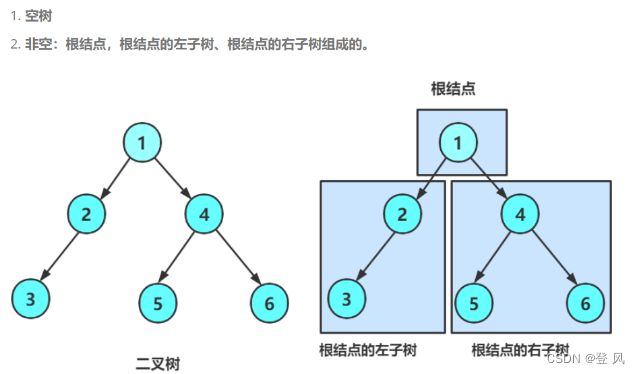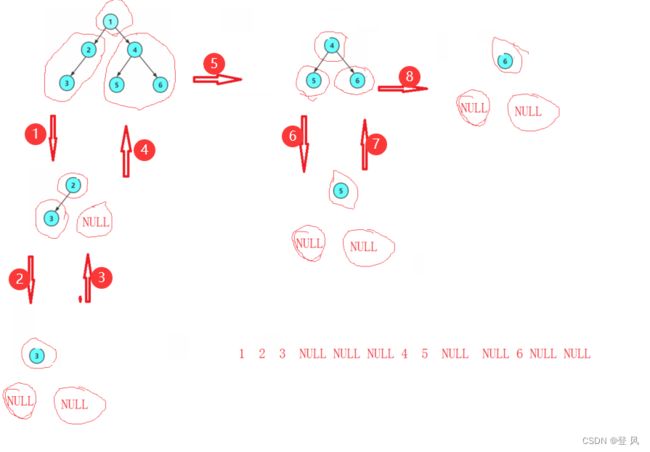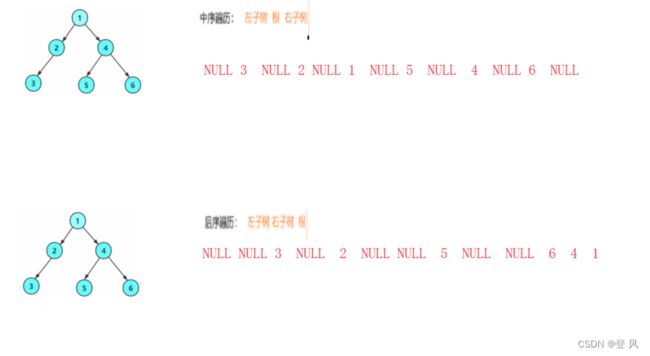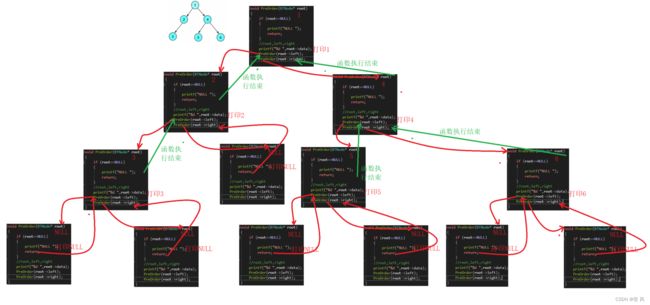数据结构-二叉树
数据结构-二叉树
-
- 二叉树的概念
- 二叉树的遍历分类
- 建立二叉树,并遍历
-
- 二叉树的最小单元
- 二叉树的最小单元初始化
- 初始化二叉树
- 前序遍历的实现
- 中序遍历的实现
- 后序遍历的实现
- 计算节点的个数
- 计算树的深度
- 求第k层的个数
- 查找二叉树的元素
- 分层遍历
- 全部代码如下
二叉树的概念
二叉树的遍历分类
规则:
1.遇到根可以直接访问根
2.遇到左子树,右子树,不可以直接访问,要将其看作一颗新的二叉树,按遍历规则,再次循环,直至左子树或右子树为空,则可访问空。
层序遍历:一层一层的进行
1 2 4 3 5 6
建立二叉树,并遍历
二叉树的最小单元
根,左子树和右子树
typedef int BTDataType;
typedef struct BinaryTreeNode
{
BTDataType data;
struct BinaryTreeNode* left;
struct BinaryTreeNode* right;
}BTNode;
二叉树的最小单元初始化
BTNode* BuyNode(BTDataType x)
{
BTNode* node=(BTNode*)malloc(sizeof(BTNode));
if (node==NULL)
{
perror("malloc fail");
return NULL;
}
node->data = x;
node->left = NULL;
node->right = NULL;
return node;
}
初始化二叉树
BTNode* CreatTree()
{
BTNode* node1 = BuyNode(1);
BTNode* node2 = BuyNode(2);
BTNode* node3 = BuyNode(3);
BTNode* node4 = BuyNode(4);
BTNode* node5 = BuyNode(5);
BTNode* node6 = BuyNode(6);
node1->left = node2;
node1->right = node4;
node2->left = node3;
node4->left = node5;
node4->right=node6;
return node1;
}
前序遍历的实现
函数的回归条件为root为空,或者函数正常结束
按照顺序依次为:根,左子树,右子树
void PreOrder(BTNode* root)
{
if (root==NULL)
{
printf("NULL ");
return;
}
//root,left,right
printf("%d ",root->data);
PreOrder(root->left);
PreOrder(root->right);
}
中序遍历的实现
函数的回归条件为root为空,或者函数正常结束
按照顺序依次为:左子树,根,右子树
void InOrder(BTNode* root)
{
if (root == NULL)
{
printf("NULL ");
return;
}
InOrder(root->left);
printf("%d ", root->data);
InOrder(root->right);
}
后序遍历的实现
函数的回归条件为root为空,或者函数正常结束
按照顺序依次为:左子树,右子树,根
void PostOrder(BTNode* root)
{
if (root == NULL)
{
printf("NULL ");
return;
}
PostOrder(root->left);
PostOrder(root->right);
printf("%d ", root->data);
}
计算节点的个数
利用分治法求节点的个数,只有节点存在时,才会+1,并返回下层的统计个数

int TreeSize(BTNode* root)
{
if (root==NULL)
{
return 0;
}
else
{
return TreeSize(root->left)
+ TreeSize(root->right)
+1;
}
}
执行结果如下:
![]()
计算树的深度
int TreeHeight(BTNode* root)
{
if (root==NULL)
{
return 0;
}
int leftHeight = TreeHeight(root->left);
int rightHeight = TreeHeight(root->right);
return leftHeight > rightHeight ?
leftHeight + 1 :
rightHeight + 1;
}
代码执行结果如下:
![]()
求第k层的个数
int TreeLevel(BTNode* root,int k)
{
if (root==NULL)
{
return 0;
}
if (k==1)
{
return 1;
}
return TreeLevel(root->left, k - 1) + TreeLevel(root->right, k - 1);
}
查找二叉树的元素
BTNode* TreeFind(BTNode* root, BTDataType x)
{
if (root==NULL)
{
return NULL;
}
if (root->data==x)
{
return root;
}
BTNode* lret = TreeFind(root->left, x);
if (lret)
{
return lret;
}
BTNode* rret = TreeFind(root->right, x);
if (rret)
{
return rret;
}
return NULL;
}
分层遍历
利用队列,先将根push,进入循环,可pop,再将层子节点push,依次循环。安照队列先进先出的原则,可实现分层打印
void LevelOrder(BTNode* root)
{
Quene q;
QueueInit(&q);
if (root)
{
QueuePush(&q,root);
}
while (!QueueEmpty(&q))
{
BTNode* front = QueueFront(&q);
QueuePop(&q);
printf("%d ",front->data);
if (front->left)
{
QueuePush(&q, front->left);
}
if (front->right)
{
QueuePush(&q, front->right);
}
}
QueueDestroy(&q);
}
结果如下:
![]()
判断是否为完全二叉树
bool TreeComplete(BTNode* root)
{
Quene q;
QueueInit(&q);
if (root)
{
QueuePush(&q, root);
}
while (!QueueEmpty(&q))
{
BTNode* front = QueueFront(&q);
QueuePop(&q);
if (front==NULL)
{
break;
}
else
{
QueuePush(&q, front->left);
QueuePush(&q, front->right);
}
}
while (!QueueEmpty(&q))
{
BTNode* front = QueueFront(&q);
QueuePop(&q);
if (front)
{
QueueDestroy(&q);
return false;
}
}
QueueDestroy(&q);
return true;
}
全部代码如下
test.c
#define _CRT_SECURE_NO_WARNINGS 1
#include Queue.c
#define _CRT_SECURE_NO_WARNINGS 1
#include "Queue.h"
void QueueInit(Quene* pq)
{
assert(pq);
pq->head = pq->tail = NULL;
pq->size = 0;
}
void QueueDestroy(Quene* pq)
{
assert(pq);
QNode* cur = pq->head;
while(cur)
{
QNode* next = cur->next;
free(cur);
cur = next;
}
pq->head = pq->tail = NULL;
pq->size = 0;
}
void QueuePush(Quene* pq, QDataType x)
{
assert(pq);
QNode* newnode = (QNode*)malloc(sizeof(QNode));
if (newnode==NULL)
{
perror("malloc fail");
return;
}
newnode->next = NULL;
newnode->data = x;
//需要判断队列中是否有元素
if (pq->head==NULL)
{
pq->head = pq->tail = newnode;
}
else
{
pq->tail->next = newnode;
pq->tail = newnode;
}
pq->size++;
}
void QueuePop(Quene* pq)
{
assert(pq);//确保有队列
assert(pq->head != NULL);//确保队列不为空
if (pq->head->next==NULL)
{
free(pq->head);
pq->head = pq->tail = NULL;
}
else
{
QNode* next = pq->head->next;
free(pq->head);
pq->head = next;
}
pq->size--;
}
int QueueSize(Quene* pq)
{
assert(pq);
return pq->size;
}
bool QueueEmpty(Quene* pq)
{
assert(pq);
return pq->size==0;
}
QDataType QueueFront(Quene* pq)
{
assert(pq);
assert(!QueueEmpty(pq));
return pq->head->data;
}
QDataType QueueBack(Quene* pq)
{
assert(pq);
assert(!QueueEmpty(pq));
return pq->tail->data;
}
Queue.h
#pragma once
#include 






